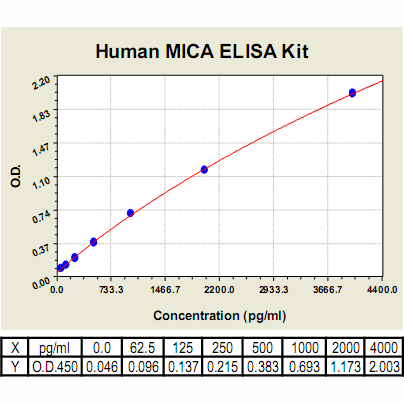Product Sheet CL0812
Description
BACKGROUND The human MHC class I chain-related genes (MICA and MICB) are located within the HLA class I region of chromosome 6. Their organization, expression and products differ considerably from classical HLA class I genes. Unlike HLA classical class I gene products, MICA does not present any antigen but acts as a ligand for several immune cells including natural killer (NK) cells bearing NKG2D receptors.1 MICA is a highly polymorphic transmembrane protein that is regulated by transcriptional and posttranscriptional mechanisms. MICA expression in normal tissues is restricted to the thymic epithelium and scattered cells in the gastrointestinal mucosa. However, MICA is commonly detected in solid and hematological malignancies, where it may be induced as part of the DNA damage response through ataxia telangiectasia mutated (ATM), ataxia telangiectasia mutated and Rad3-related (ATR), and checkpoint kinases 1 and 2 (chk-1 and -2). MICA activates NK cells and co-stimulates T cells by interaction with its immunoreceptor NKG2D. In contrast, soluble MICA (sMICA) molecules impair the functions of NKG2D+ T and NK cells, which may facilitate tumor cell escape from immunosurveillance.2
MICA displays the greatest degree of polymorphism. MICA alleles can be divided into two large groups with the polymorphisms found in alpha3 domains. This division could be explained by a possible polyphyletic origin that is in line with recent findings from evolutionary, population and functional studies of this gene. MICA polymorphisms are associated with a number of diseases related to NK activity, such as viral infection, cancer and allograft rejection or graft-versus-host disease (GVHD). The mechanisms underlying these associations include NK cell-mediated cytotoxicity and MICA shedding to produce immunosuppressive soluble MICA particles. The MICA-induced humoral response has attracted interest recently because of its possible role in graft rejection in solid organ transplantation.3
MICA displays the greatest degree of polymorphism. MICA alleles can be divided into two large groups with the polymorphisms found in alpha3 domains. This division could be explained by a possible polyphyletic origin that is in line with recent findings from evolutionary, population and functional studies of this gene. MICA polymorphisms are associated with a number of diseases related to NK activity, such as viral infection, cancer and allograft rejection or graft-versus-host disease (GVHD). The mechanisms underlying these associations include NK cell-mediated cytotoxicity and MICA shedding to produce immunosuppressive soluble MICA particles. The MICA-induced humoral response has attracted interest recently because of its possible role in graft rejection in solid organ transplantation.3
REFERENCES
1. Raulet, D.H.: Nat. rev. Immunol. 3:781-90, 2003
2. Stephens, H.A.F.: Trends Immunol. 22:378-85, 2001
3. Bahram, S.: Adv. Immunol. 76:1-60, 2001
2. Stephens, H.A.F.: Trends Immunol. 22:378-85, 2001
3. Bahram, S.: Adv. Immunol. 76:1-60, 2001
Products are for research use only. They are not intended for human, animal, or diagnostic applications.
Details
Cat.No.: | CL0812 |
Target Protein Species: | Human |
Range: | 62.5pg/ml – 4000 pg/ml |
Specificity: | No detectable cross-reactivity with other cytokines |
Storage: | Store at 4°C. Use within 6 months. |
ELISA Kits are based on standard sandwich enzyme-linked immunosorbent assay technology. Freshly prepared standards, samples, and solutions are recommended for best results.
Products
| Product | Size | CAT.# | Price | Quantity |
|---|---|---|---|---|
| Human MICA ELISA Kit: Human MHC Class I Polypeptide-Related Sequence A ELISA Kit | Size: 96 Wells | CAT.#: CL0812 | Price: $581.00 |

